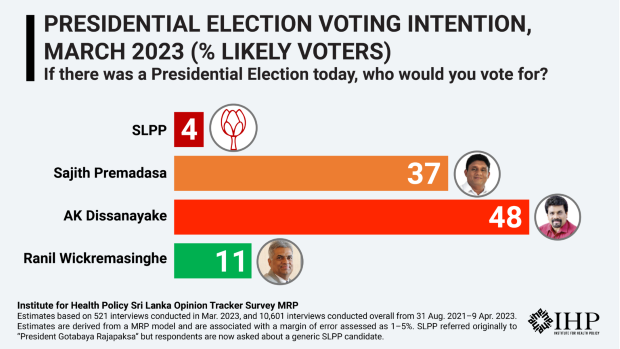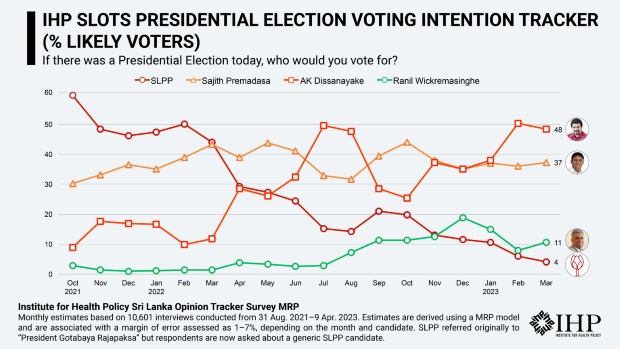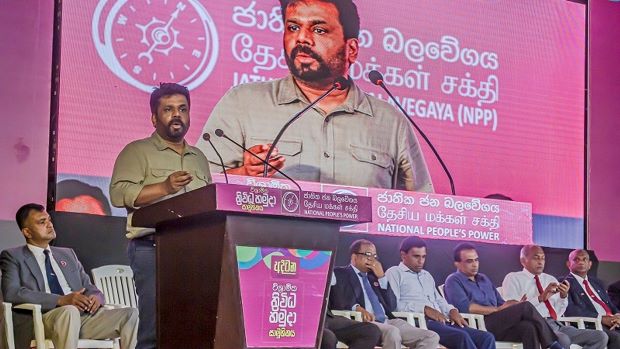AKD leads in potential presidential election race
By Ravi P. Rannan-Eliya
COLOMBO – In the first release of results from Institute for Health Policy’s (IHP) Sri Lanka Opinion Tracker Survey (SLOTS) tracking of presidential election voting intent, A.K. Dissanayake, National People’s Power (NPP)/Janatha Vimukthi Peramuna (JVP) leader, led with 48% of likely voters in March 2023, ahead of Sajith Premadasa, Samagi Jana Balawegaya (SJB) leader on 37%. Both ranfar ahead of President Ranil Wickremesinghe on 11% and a generic Sri Lanka Podujana Peramuna (SLPP) candidate on 4%. Estimates are associated with a margin of error of 1–5%.

Voter preferences for a hypothetical presidential election track general election preferences. Support for re-electing President Gotabaya Rajapaksa and more recently a generic SLPP candidate has continuously fallen since late 2021. Fewer than 10% of voters now support a generic SLPP candidate although it’s certainly possible that a named SLPP candidate might fare differently -worse or better.
NPP/JVP leader A.K. Dissanayake has been the main beneficiary with his support increasing from the low teens in late 2021 to the mid-40s by early 2023. Support for SJB leader, Sajith Premadasa, has also increased over time but only modestly by 5-10%.
Support for A.K. Dissanayake has been more volatile than for Sajith Premadasa with the two switching leads several times since President Gotabaya Rajapaksa’s resignation. The general trends suggest that Sajith Premadasa benefits from a more loyal core support base while support for A.K. Dissanayake fluctuates as former Gotabaya Rajapaksa voters switch between him and other candidates.
Support for Ranil Wickremasinghe in a potential presidential election was boosted after he became President in mid-2022 but his honeymoon with the voters dissipated by early 2023. However, the latest polling in March, in which he gained 3%, suggests a possible increase in voters support for a potential Wickremasinghe candidacy although he continues to run well behind the two main leaders.

A.K. Dissanayake appears to have an advantage in voter enthusiasm over Sajith Premadasa as his lead among all voters was only 8% (47% to 39%) compared with 11% amongst likely voters. This contrasts with a similar sized advantage in voter enthusiasm that the SJB enjoys over the NPP/JVP in general election preferences.
Based on reported voter preferences, it is likely that A.K. Dissanayake would have won a presidential election held in March. Although his support was below the required 50% to win a presidential election, it is likely he would have won enough second preferences from Ranil Wickremasinghe and SLPP voters to put him over the top.
The SLOTS tracking of voter preferences in a hypothetical presidential election only offers respondents a choice of the four candidates. It’s entirely possible that the entry of new candidates or one or more of the four parties represented combining would lead to different results. Of these a SLPP-UNP combination might make more sense since SLOTS polling indicates their supporters are much closer in their views and past voting history, but this would still not be able to gain more than a fifth of the vote currently. An SJB-UNP tie up might be more competitive since their combined share of voter preferences is close to the NPP/JVP share but it would be hazardous to assume that all or most of the UNP voters today would opt for a SJB candidate as many are ex-Gotabaya Rajapaksa/SLPP voters.
How IHP estimates voting intention
IHP’s voting intention estimates use polling data from the Sri Lanka Opinion Tracker Survey (SLOTS), which is a national phone survey that has been tracking public opinion every day since August 2021, interviewing people across the country. Respondents are drawn from a mixed sample of a national representative panel of respondents previously recruited in 2019 through face-to-face interviews from all parts of the country, and others reached by randomly dialling mobile numbers. SLOTS asks respondents who they voted for in the 2019 and 2020 elections, and who they intend to vote for in a hypothetical presidential and general election held today. To minimize bias, the order in which voting choices are presented is randomized between respondents.
– Institute for Health Policy 2023



Comments are closed, but trackbacks and pingbacks are open.